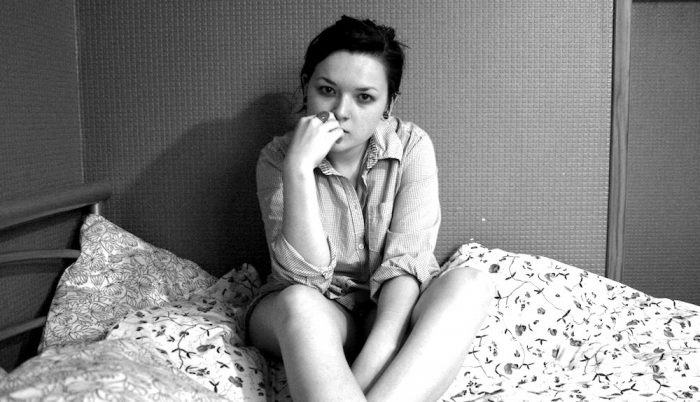My social media feed is bombarded with courses, workshops, tips, and tricks about how to be happier and more successful.
Ironically, this really gets me down.
Whenever I hear that I should do this that or the other and I will experience everlasting states of relaxation, success, and happiness, I feel like a failure. Like I am somehow failing at life when I am not feeling happy or relaxed or don’t fit into a narrow definition of success.
I feel this messaging of everlasting states of happiness is misleading, because it fundamentally misses the point of being human. We are never going to achieve that. We will have success and failure, we will get sick, we will go up and go down and left and right. This is the reality of being alive.
For so long, believing that I should always feel happy and healthy added a struggle in my life that was unnecessary. For years, I struggled with the fact that I have a body that reacts strongly to life. With this body, I have all kinds of symptoms that doctors tell me are nothing, but for me can be extremely debilitating. I hated this. I felt that I wanted nothing more than to feel better and be happier, but how could I be happy when I was not feeling well? Telling me that my happiness was in my own hands made me feel like I was somehow doing something wrong, that it was my fault that I felt the way I did.
But something changed. I now feel empowered to manage my own happiness, success, and relaxation. Slowly, I have begun to realize that I do not have to feel a certain way, have a specific thing, or be successful to be happy, to enjoy, and to get the most out of life. This realisation has given me more freedom than I can even begin to explain.
So, what changed? Quite simply, it was how I looked at my own experience. Instead of looking at my experience through a lens of “not good enough” or “not how I want it to be” or “not successful,” I started letting my experience be as it already was. With this lens, I discovered a power that I never felt before. A power to change what needs changing from a place that is already good enough, without striving.
This change was triggered by meditation. Of course, I did not know that this would happen when I started meditating. I started meditating in the hope that all my symptoms would disappear, that I would feel better and healthier and find that elusive eternal state of happiness.
But as time went by, the simple, powerful act of sitting still for, in my case, 30 minutes a day, made me see everything through a different lens, and that lens did make me happier, but not in the way that I first thought, and not in the way the happiness gurus told me, and not happy in the way society told me what happiness was. Happy being me, with my life, with all the ups and downs.
There were two realisations that changed everything for me:
#1: A lot of my suffering came from my own thoughts.
When I sat in silence for 30 minutes a day, I was astonished to see that my thoughts were effectively making everything worse.
I felt a twinge in my body, and I thought I am going to die. I did not see this as a thought; I saw it as the truth. My body reacted to that thought, and before I was even aware of it, I was in full-blown anxiety. Not because of the twinge, but because of the thought.
Or, I felt tired. My thoughts were telling me, You weak person, you should not be tired. Why are you tired? You have no reason to be tired. Get over it. I was telling myself that what I was feeling (tired) was bad, and that I was obviously doing something wrong to feel this way.
These are my examples, and many variations of these types of thoughts are possible. We are all unique in our thought patterns, but we are all the same in the fact that our thoughts can literally make everything worse.
One of the most common examples of thoughts that make everything worse are thoughts about not being good enough. In my job, I hear a lot of people tell me that they have thoughts that tell them that they are not worthy, not good enough, and that they should be doing better. Getting lost in these types of thoughts does not actually make you feel better or get you to achieve more, quite the opposite.
What can you do?
Start to identify your own thoughts. You can do this by meditating and taking note of the thoughts that come up repeatedly. What are your thought patterns, and are they making you feel better or worse? I love writing down my thought movies; I name the movie and the main plot line and then, when it comes up again, I can say “I have seen this movie before” and choose to not get lost in the story again.
#2: I was fighting reality.
This was a big one and is still the one that I have to remind myself of repeatedly. As I am human, I get sick, tired, anxious, and all kinds of other things that I would much, much rather not have. But they are there. Judging that, pretending that it is not true, hating the feeling, all make that reality harder. Not only do those reflexes make things harder, they do not help one little bit in relieving the symptoms.
Basically, my strategy to “be strong” and pretend that I did not feel what I was feeling was a lose-lose situation. Fun times. Yet, I was indoctrinated by my own culture (I am from the Netherlands) that dealing with things in this way was strong and that you should never complain, especially not about things that are “just in your head.”
This is actually quite toxic. What I learned, slowly, was to let my body feel what it was feeling. By letting it be, I could much better decide what, if anything, I could do. Not to change how I was feeling, but to respond wisely with everything that I was feeling. This is, in fact, incredibly difficult, but also empowering. It allows you to be real about how you are feeling without it taking over your life and identity. It also allows you to not need the recognition of others in your pain or struggle, but to stand strong and take up the space you need without being overwhelmed by hopelessness or feelings of “why me.”
This recognition thing is a side effect of stopping to fight reality. My aches, pains, anxiety, and other unwanted things had a much stronger hold on me when I was fighting them and not recognising them. Now, I let them be, not hiding them from anyone, most importantly myself.
What can you do?
Identify your reality. What are the things in your life that are here but you would rather not have? Can you try to be with these without having to change them? Can you watch them come and go, because they do? Also, when your reality is challenging, ask yourself the question, “How can I best take care of myself?”
These two realisations changed everything for me. By not fighting reality and learning to navigate my thoughts is a different way, I changed the lens with which I looked at my experience.
Allowing myself to be human, to have human emotions and struggles, has made me stronger, more empowered, kinder, and has made life so much easier. Not constantly blissful, happy, and successful, but real.
That should be the message we give about happiness—not something to strive for, but something that can always be here if we can let ourselves be real. We would be so much happier for it.












Read 0 comments and reply